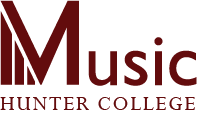General information on Hunter’s music programs can be found following the links provided for Prospective Students. For quick, downloadable summaries of this information, click on the links below:
If you have further questions, you may email music@hunter.cuny.edu
Four semesters, beginning in the fall, from the time you begin major courses. Students who do not have the prerequisite knowledge and skills must take non-major courses before beginning the major (see questions 4 and 5).
Yes. All music majors can be completed in either the day or the evening.
Before you may declare the major or be given permission to register for any music major courses, you must first pass placement exams in basic music theory and history, and complete a performance audition/musicianship skills evaluation, so that we can properly gauge your ability. For information about the content and scheduling of those exams, read the information provided for Prospective Students, or click on the links below:
- Audition and Entrance Exam Registration Form
- Entrance Exam Contents (PDF)
- Entrance Exam in Music History - SAMPLE (PDF)
- Entrance Exam in Music Theory - SAMPLE (PDF)
If you have further questions, you may email music@hunter.cuny.edu
MUSTH 101 (Music Theory Fundamentals) covers the prerequisite information for MUSTH 220 (Music Theory 1) and MUSTH 230 (Musicianship 1); MUSHL 101 (Introduction to Music) covers the prerequisite information for MUSHL 205 (Music History 1); MUSPF 211-212 (Voice 1-2) and MUSPF 213-214 (Piano 1-2) prepare students for performance auditions in voice and piano. You may take these courses or study the required information on your own and repeat the exams. Students who wish to specialize in an instrument other than voice or piano, but do not pass the entrance audition on that instrument, must take private lessons at their own expense until they reach the required level of skill.
You must take placement exams in order to transfer credit in music history, music theory, or musicianship toward a music major. Performance credits are normally transferred without examination. All credits earned at other schools count automatically as electives, but credits may be used toward the major only if the student places out of Hunter’s requirements by examination.
Students must perform 3-4 contrasting pieces on their instrument or voice. To request an audition or for information on audition requirements, click on the links below:
You must take entrance exams in order to take these courses, whether or not you are majoring in music (see questions 4 and 5 above).
You must be a declared music major or minor, audition with a faculty member, submit a teacher assignment form, and study with a Hunter faculty member or Performance Instructor. Audition dates are the same as those for entrance exams (see question number 4 above). For further information on private lesson policies or the Teacher Assignment Form, click on the menu items below:
We offer both B.Mus. and B.A. degrees in Jazz Performance. In addition, we have three jazz performing groups, as well as regular courses in jazz harmony & arranging, jazz history, and improvisation. Although we do offer some music technology related courses, we do not offer a dedicated degree in music technology, and we do not offer courses in audio engineering. Finally, we do not currently offer courses in music business.
We no longer offer an undergraduate concentration in music education at Hunter. Prospective music educators would first complete our BA degree with a 42-credit major in music, and then go on to apply for the MA program in music education, which leads to New York State certification.
The minor requires 15 credits. For specific requirements, click here to read a complete description.




